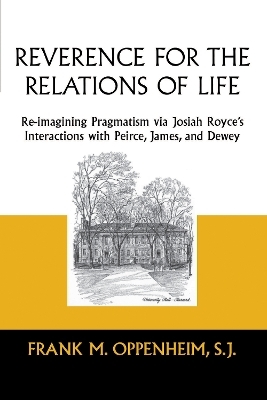
Reverence for the Relations of Life
Re-imagining Pragmatism via Josiah Royce's Interactions with Peirce, James, and Dewey
Seiten
2016
University of Notre Dame Press (Verlag)
978-0-268-15986-3 (ISBN)
University of Notre Dame Press (Verlag)
978-0-268-15986-3 (ISBN)
- Lieferbar (Termin unbekannt)
- Versandkostenfrei
- Auch auf Rechnung
- Artikel merken
A provocative look at Josiah Royce's relations with the ‘big three’ American pragmatists: Charles Pierce, William James, and John Dewey
Josiah Royce and William James lived in Cambridge, Massachusetts, on Irving Street, just two doors apart, and Charles Peirce grew up only blocks away. John Dewey was born and educated in nearby Vermont. These four great thinkers shared more than geographic space; they engaged in a series of formative philosophical discussions. By tracing the interactions of Royce (1855–1916) with James, Peirce, and Dewey, Oppenheim "re-imagines pragmatism" in a way that highlights the late Royce's role as mediator and favors the "seed-plant" image of O. W. Holmes, Jr., over the corridor image of Papini.
Josiah Royce emphasized that communities of all sizes—ranging from families to towns—needed "reverence for the relations of life" not only to thrive but to survive. This theme permeates the dialectic of Royce’s interactions with Peirce, James, and Dewey. Oppenheim analyzes the agreement and disagreement of these thinkers on the method and content of philosophy, skepticism and intelligibility, and nominalism and intentionality, as he uncovers their varied stances toward transcendent Reality.
Oppenheim repudiates Ralph Barton Perry’s tactic of using Royce as a foil to display James positively, by offering a richer portrait of Royce. Oppenheim calls attention to Royce’s "doctrine of two levels" and its effects on the distinction of human and super-human, by showing the contrast of Royce’s "third attitude of will" against two primarily self-centered attitudes of will, and by examining the roles of Spirit, Community, and semiotic process in Royce’s late thought.
Josiah Royce and William James lived in Cambridge, Massachusetts, on Irving Street, just two doors apart, and Charles Peirce grew up only blocks away. John Dewey was born and educated in nearby Vermont. These four great thinkers shared more than geographic space; they engaged in a series of formative philosophical discussions. By tracing the interactions of Royce (1855–1916) with James, Peirce, and Dewey, Oppenheim "re-imagines pragmatism" in a way that highlights the late Royce's role as mediator and favors the "seed-plant" image of O. W. Holmes, Jr., over the corridor image of Papini.
Josiah Royce emphasized that communities of all sizes—ranging from families to towns—needed "reverence for the relations of life" not only to thrive but to survive. This theme permeates the dialectic of Royce’s interactions with Peirce, James, and Dewey. Oppenheim analyzes the agreement and disagreement of these thinkers on the method and content of philosophy, skepticism and intelligibility, and nominalism and intentionality, as he uncovers their varied stances toward transcendent Reality.
Oppenheim repudiates Ralph Barton Perry’s tactic of using Royce as a foil to display James positively, by offering a richer portrait of Royce. Oppenheim calls attention to Royce’s "doctrine of two levels" and its effects on the distinction of human and super-human, by showing the contrast of Royce’s "third attitude of will" against two primarily self-centered attitudes of will, and by examining the roles of Spirit, Community, and semiotic process in Royce’s late thought.
Frank M. Oppenheim, who is widely regarded as an expert on Josiah Royce, brings more than 40 years of study to bear on this magnum opus. Reverence for the Relations of Life will be essential reading for those interested in American philosophy and theology.
| Erscheinungsdatum | 01.01.2017 |
|---|---|
| Verlagsort | Notre Dame IN |
| Sprache | englisch |
| Maße | 152 x 229 mm |
| Themenwelt | Geisteswissenschaften ► Geschichte ► Allgemeines / Lexika |
| Geisteswissenschaften ► Geschichte ► Regional- / Ländergeschichte | |
| Geschichte ► Teilgebiete der Geschichte ► Kulturgeschichte | |
| Geisteswissenschaften ► Philosophie ► Ethik | |
| Geisteswissenschaften ► Philosophie ► Geschichte der Philosophie | |
| Geisteswissenschaften ► Philosophie ► Philosophie der Neuzeit | |
| ISBN-10 | 0-268-15986-6 / 0268159866 |
| ISBN-13 | 978-0-268-15986-3 / 9780268159863 |
| Zustand | Neuware |
| Informationen gemäß Produktsicherheitsverordnung (GPSR) | |
| Haben Sie eine Frage zum Produkt? |
Mehr entdecken
aus dem Bereich
aus dem Bereich
der stille Abschied vom bäuerlichen Leben in Deutschland
Buch | Hardcover (2023)
C.H.Beck (Verlag)
CHF 32,15
vom Mittelalter bis zur Gegenwart
Buch | Softcover (2024)
C.H.Beck (Verlag)
CHF 16,80


